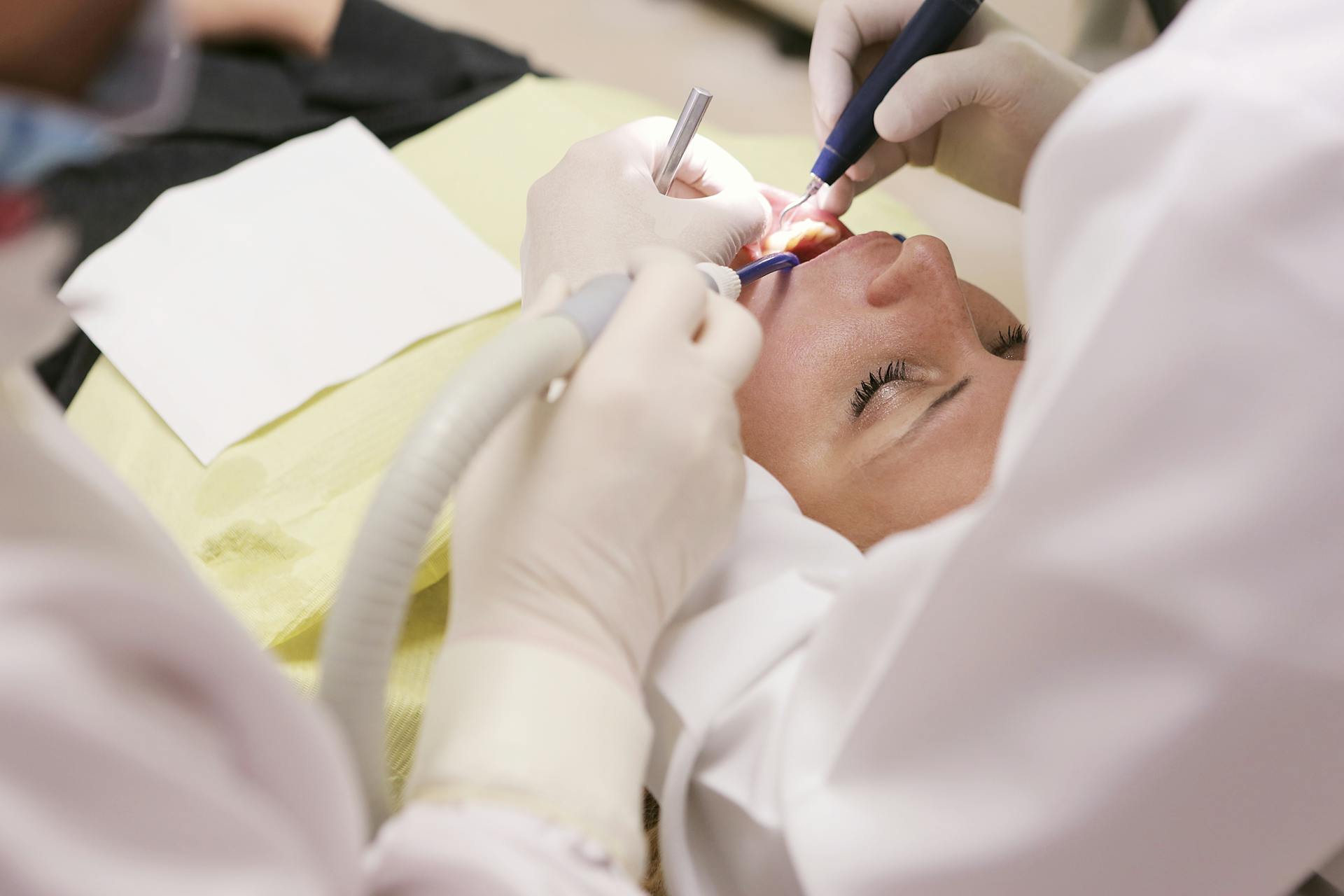A team of researchers have looked into the possibility of tracking the progression of Gum Disease through the use of saliva samples. Managing the progression of gum disease is notoriously difficult, posing problems for both dentists and patients. But these new findings could change this and offer improvements in controlling gum disease.

Tracking the progression of Gum Disease can be challenging for dentists. Likewise, for patients, it can be very difficult to keep track of the health of their gums.
However, new research has found that measuring the levels of certain proteins in the saliva of patients could provide better information on the progression of gum disease [1].
This is an important finding. Due to the huge number of people that have gum disease, any additional knowledge on the condition is helpful.
Gum Disease
Gum disease is an oral health condition which involves the gums becoming red, swollen, sore, and often inflamed [2].
It is a very common condition, with gum disease affecting a huge number of people around the world. In fact, research shows that gum disease impacts almost half of American adults [3].
In severe and advanced cases of gum disease, bone loss can occur, which can result in teeth needing to be removed. Pain is also common.
Unfortunately, there is no cure for gum disease. However, some treatments to slow its progression, such as root planing and scaling, do exist.
One of the challenges with gum disease is the difficulty in tracking its progression. Because the condition develops over a long period of time, monitoring its progress is difficult. Therefore, attempts at improving this are always welcomed.
The Research
The research was carried out by a team from the University of Pennsylvania’s Penn Dental Medicine. Their findings have been published in the Journal of Clinical Periodontology [1].
The researchers pointed out that it is very difficult to predict gum disease progression. They noted that in theory, periodic testing of saliva can help [1].
However, past studies that have explored this have only looked at short-term results. Instead, the researchers were looking to produce long-term results [1].
Therefore, the researchers set up a study that involved testing, monitoring, and tracking the saliva samples of more than 400 participants over an 18 month period [1].
This included 302 individuals with early to moderate gum disease, and 113 individuals without signs of gum disease. The 415 participants all had assessments of gum disease status and progression every two months over a 12 month period [1].
At each of these assessments, the researchers also took saliva and blood samples from each participant. Consequently, these samples were tested.
The saliva samples were tested for 10 inflammation-linked proteins. Meanwhile, blood samples were tested for 5 inflammation-linked proteins [1]. These proteins have been linked to inflammation through previous research.
Then, at the end of the year, the researchers provided the participants with non-surgical periodontal therapy, and checked them again after three and six months [1].
The Results
The results were interesting. They showed that patients who had the most gum disease progression had substantially higher levels of several of the inflammation-linked proteins in their saliva samples [1].
On average, those that experienced progression of gum disease had higher levels of nine inflammation-related signaling proteins in saliva, when compared to those that did not [1].
Among the inflammation-linked proteins that the researchers found were high in number included interferon-gamma, IL-6, VEGF, IL-1β and MMP-8 [1]. The good news is that following treatment, these high levels lessened.
In terms of the blood samples, the levels of inflammation-linked proteins did not differ among participants – irrespective of the degree of gum disease progression [1].
Therefore, the findings suggest that the changes in inflammation-related proteins in saliva over time can offer a robust way of assessing the progression, and ongoing risk, of gum disease [1].
Lead author Flavia Teles is an Associate Professor at Penn Dental Medicine. Teles suggested that she envisaged a “saliva test kit that dentists could use” to monitor the condition [4].
Continuing, Teles suggested that such a kit “could be a very useful personalized-dentistry tool for assessing risk and tailoring care delivery” [4].
In terms of next steps, the researchers are hoping to carry out further analysis. The samples will be analysed further, with a focus on bacterial species and metabolites – in case these provide further insights [1].
These are useful and promising findings. It suggests that the progression of gum disease can be tracked, which can aid efforts towards managing the condition for patients.
Thinking points…
[1] As discussed earlier, gum disease affects so many of us. But it can be prevented – with looking after our teeth and gums crucial. A good way of aiding this is to attend regular dental check-ups, as these offer the chance for a dentist to take a look a look at your oral health, including your gums. They can provide you with advice, and if necessary, treatment. We recommended booking an appointment now!
[2] While gum disease can’t be cured, it is possible to slow the progression of the condition. Possible treatments include root planing and scaling. These can help boost the health of your gums. If you are concerned about your gums, you could discuss your situation with your dentist. When you next see them, why not ask about gum disease treatments?
What we offer at Taradale Dental
Taradale Dental is a dental clinic based in Calgary, Alberta, Canada. At our Calgary dental clinic, we provide a range of services for our patients.
We advise our patients to attend our Calgary dental clinic at least twice per year for a regular dental check-up. At these check-ups, we provide a comprehensive review of a patient’s oral health. If any problems are detected, we have many treatments available. For example, these include cavity fillings and root canals. To strengthen your oral health, we recommend brushing your teeth at least twice a day and flossing regularly.
Here at Taradale Dental, we also have some cosmetic treatments available! These include dental implants, teeth whitening and Invisalign™! Our patients find that these treatments have a positive impact on their appearance, confidence and self-esteem.
Moreover, the fees of our treatments at our Calgary dental clinic Taradale Dental are set in line with the Alberta Dental Fee Guide. This ensures transparent and fair pricing, with no hidden costs.
We hope to see you soon at our Taradale Dental clinic in Calgary! You can find out more about us by visiting our website https://taradaledental.ca/!
References
[1] Teles, F. R. F., Chandrasekaran, G., Martin, L., et al. (2024). Salivary and serum inflammatory biomarkers during periodontitis progression and after treatment. Journal of Clinical Periodontology. 51 (12): p1619-1631. DOI: https://doi.org/10.1111/jcpe.14048.
[2] NHS. (2022). Gum disease. Available: https://www.nhs.uk/conditions/gum-disease/. Last accessed: 10th January 2025.
[3] Centers for Disease Control and Prevention. (2024). Periodontal (Gum) Disease. Available: https://www.cdc.gov/oral-health/about/gum-periodontal-disease.html . Last accessed: 10th January 2025.
[4] University of Pennsylvania. (2025). Saliva proteins linked to gum disease progression identified. Available: https://medicalxpress.com/news/2025-01-saliva-proteins-linked-gum-disease.html. Last accessed: 10th January 2025.


